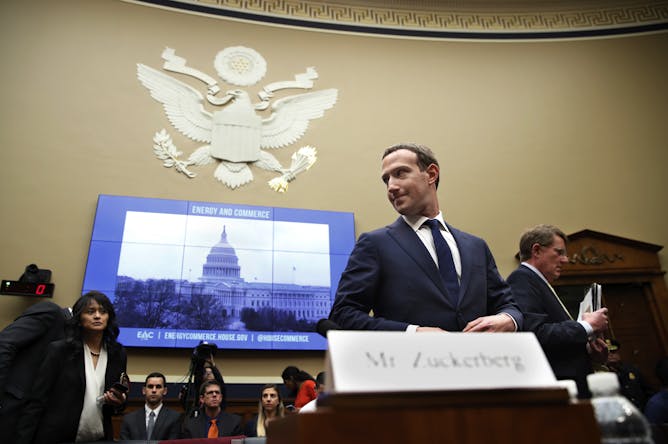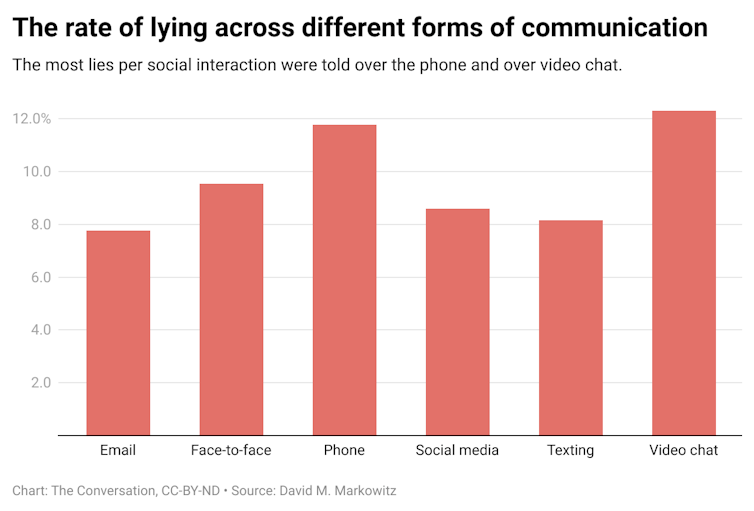|
Just as there are numerous ways Facebook has caused trouble in the world – allowing the spread of misinformation, doing little to block hate speech, stirring up resentment and division, harming teens’ well-being – there are quite a few ideas about what to do about it.
Politicians on the right have called for revoking Section 230, the law that shields social media companies from legal consequences for the content their users post. Politicians on the left have called for breaking up Facebook and the other Big Tech giants.
We asked three scholars who study social media from different perspectives to spell out their top priority for congressional action on Facebook. True to form, Michigan State’s Anjana Susurla, University of Washington’s Ryan Calo and Tuft’s Bhaskar Chakravorti offer three very different ways Congress could take advantage of the growing pressure to rein in Facebook.
Also today:
|

Congress has asked many questions of Meta CEO Mark Zuckerberg but has done little to regulate Facebook.
AP Photo/Jacquelyn Martin
Anjana Susarla, Michigan State University; Bhaskar Chakravorti, Tufts University; Ryan Calo, University of Washington
Pressure is mounting on Congress to take action on Facebook. Our panel of experts offers their top priorities: user control of data, banking-like oversight and resources to close the digital divide.
|
Politics + Society
|
-
Celine-Marie Pascale, American University
Millions of Americans struggle to pay their bills each month, despite earning wages well above the federal poverty line and holding multiple jobs.
|
|
Education
|
-
Sareh Karami, Mississippi State University; Mehdi Ghahremani, Mississippi State University; Robert Sternberg, Cornell University
Parents often want their kids to be creative. But while creativity has many benefits, it can also be used for harm. Here’s how to teach kids to harness their imagination for the common good.
|
|
Ethics + Religion
|
-
Brooke Schedneck, Rhodes College
On World Kindness Day, a scholar of Buddhist studies explains its idea of compassion and the diverse ways to think about and express kindness.
|
|
Economy + Business
|
-
Jessica Eise, The University of Texas at San Antonio
Combining the UN’s expertise and global reach with Musk’s wealth and revolutionary problem-solving could make a difference, a world hunger expert argues.
-
Tinglong Dai, Johns Hopkins University; Christopher S. Tang, University of California, Los Angeles
Two supply chain experts see a major flaw in how ratings agencies measure companies’ environmental, social and governance performance.
|
|
Environment + Energy
|
-
Jill Hopke, DePaul University
Misinformation about climate change has been spreading in other ways, and social media companies have been reluctant to stop it.
|
|
Health
|
-
Patricia L. Foster, Indiana University
Chickenpox has largely disappeared from the public’s memory thanks to a highly effective vaccine. But the virus’s clever life cycle allows it to reappear in later adulthood in the form of shingles.
|
|
Arts + Culture
|
-
Elizabeth A. Blake, Clark University
She never ages. Her visage morphs. And yet women used to write letters to this brainchild of advertising executives, a cultural icon who still looms large in the nation’s imagination.
|
|
Trending on Site
|
-
Ana Maria Dimand, Boise State University
The government uses a process called public procurement. A professor of public policy explains how the process works and how it is increasingly used to achieve social goals.
-
Nathaniel Hafer, UMass Chan Medical School
The two types of COVID-19 tests – antigen and PCR – work in very different ways, which is why one is fast but less accurate and the other is slow and precise.
-
Ravindra Palavalli-Nettimi, Florida International University; Jamie Theobald, Florida International University
A fly does some of its digesting outside its body before it even eats any food.
Today’s graphic

From the story, Are people lying more since the rise of social media and smartphones?
|
|